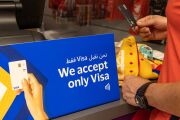
Sports have long been
Showcasing new payment options in a centralized setting served three goals for Visa. It expanded purchases that benefited Visa; it increased adoption at small businesses in Visa's network; and it exposed travelers to payment methods that they may want to use back home.
In an effort to build acceptance for contactless payments, the card network deployed more than 3,500 terminals at small businesses in the Paris metropolitan area over the past three years. For the Paris Olympics, Visa integrated the small businesses with a VisaGo app to link spectators directly to the businesses.
In addition to the uptick in contactless payments, these businesses saw a 26% increase in sales from Visa consumers, according to the card network.
U.S. consumers accounted for 29% of the local Paris metro spending, making Americans the largest source of tourist income. This could encourage more usage of contactless payments in the U.S., which adopted contactless payments
Japanese consumers made up the fastest expansion, more than doubling spending in Paris over the same weekend the prior year.
Tying contactless payments to the VisaGo app brought together two relatively new technologies for the card brand. Visa
"International sports venues like the Olympics create opportunities to both test and showcase new technology. And it's a temporary venue so there's no long-term sunk cost," said Thad Peterson, a strategic adviser for Datos Insights. "It's also a global sampling and branding tool, exposing thousands of affluent global visitors to the brand's technology."VisaGo links payments and shopping to related content, such as news about athletes that are part of Visa marketing campaigns, setting up an opportunity to stack more of the customer experience on top of checkout.
"Imagine showing up to an event and your kid gets handed their favorite player's jersey as your family gets whisked to seats where cold drinks and hot food are already paid for and waiting," d said Rob Cameron, Global Head of Acceptance Solutions, Visa. "This is what we're building towards."
Visa's plan is to extend use of the new payment methods beyond the actual event, embedding mobile shopping, payments and sharing related content into social media, fantasy leagues, fan clubs, bars and restaurants, Cameron said, adding this adoption could extend across Visa's network of about 130 million merchants.
"The future of the fan experience is omnichannel, and the opportunity to engage with fans when and where they are has perhaps never been greater," Cameron said.
The VisaGo app, which is available in the App Store and Google Pay Store, includes an integration with Apple Wallet, which enables biometric authentication and tokenized payments, according to Michael Seaman, the CEO of Swipesum, a payments company that partnered with Visa on Olympic technology. Tokenization refers to creating individual card numbers for each transaction, theoretically making that card unusable if stolen. Another app feature includes a digital map to locations in and around Paris along with incentives to shop and pay at those locations.
"The key here is making everything seamless," Seaman said, adding that the integration of merchant location, shopping, marketing and payments will be the way payment companies and financial institutions will gain traction with consumers in the future.
Visa's other sports tie-ins include the FIFA World Cup and related soccer events. Rival Mastercard links its marketing and payment technology development with sporting events, including
Payment technology companies also use sports as a way to showcase new products. Contactless technology firm Appetize deployed its ordering and payment system at
The strategy can backfire. Google recently pulled an Olympic-themed ad that depicted its Gemini artificial intelligence product partially writing a fan letter to an Olympian. The ad was criticized for allegedly replacing the young fan's creativity with a bot.
While Google argued the ad depicted Gemini as a way to spark the letter, it removed the ad from Olympics coverage.
"The risk is that a new technology will perform badly and the audience will have a less than positive experience," Peterson said






